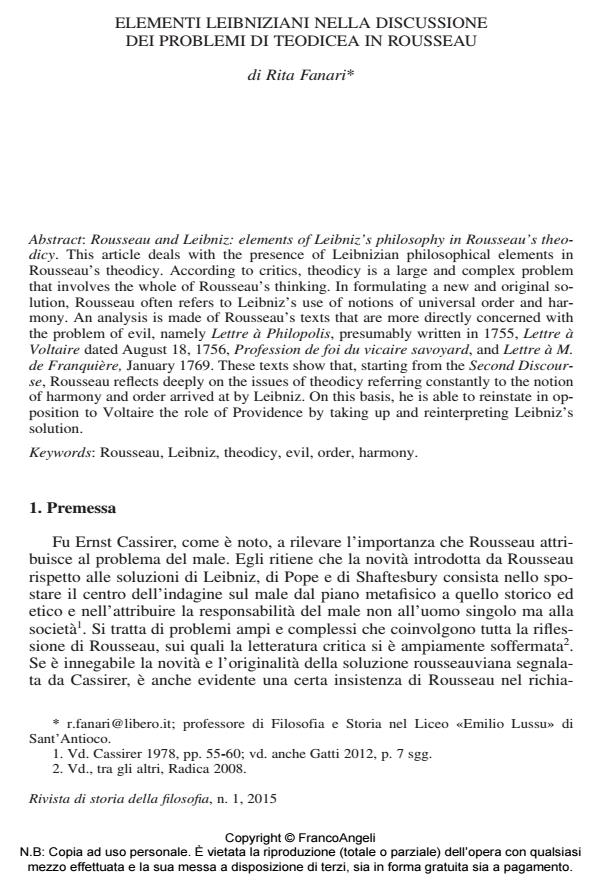Rousseau and Leibniz: elements of Leibniz’s philosophy in Rousseau’s theodicy
Journal title RIVISTA DI STORIA DELLA FILOSOFIA
Author/s Rita Fanari
Publishing Year 2015 Issue 2015/1
Language Italian Pages 14 P. 35-48 File size 562 KB
DOI 10.3280/SF2015-001004
DOI is like a bar code for intellectual property: to have more infomation
click here
Below, you can see the article first page
If you want to buy this article in PDF format, you can do it, following the instructions to buy download credits

FrancoAngeli is member of Publishers International Linking Association, Inc (PILA), a not-for-profit association which run the CrossRef service enabling links to and from online scholarly content.
This article deals with the presence of Leibnizian philosophical elements in Rousseau’s theodicy. According to critics, theodicy is a large and complex problem that involves the whole of Rousseau’s thinking. In formulating a new and original solution, Rousseau often refers to Leibniz’s use of notions of universal order and harmony. An analysis is made of Rousseau’s texts that are more directly concerned with the problem of evil, namely Lettre à Philopolis, presumably written in 1755, Lettre à Voltaire dated August 18, 1756, Profession de foi du vicaire savoyard, and Lettre à M. de Franquière, January 1769. These texts show that, starting from the Second Discourse, Rousseau reflects deeply on the issues of theodicy referring constantly to the notion of harmony and order arrived at by Leibniz. On this basis, he is able to reinstate in opposition to Voltaire the role of Providence by taking up and reinterpreting Leibniz’s solution.
Keywords: Rousseau, Leibniz, theodicy, evil, order, harmony.
- - Barber 1955: William Barber, Leibniz in France. From Arnauld to Voltaire, Clarendon, Oxford 1955.
- - Cassirer 1978: Ernst Cassirer, Il problema Gian Giacomo Rousseau, tr. it. La Nuova Italia, Firenze 1978.
- - Gatti 1996: Roberto Gatti, L’enigma del male, Studium, Roma 1996.
- - Gatti 2012: Id., Il male e la politica, Studium, Roma 2012.
- - Leibniz 1900: Gottfried Wilhelm Leibniz, Essais de Theodicée, in OEuvres philosophiques, Alcan, Paris 1900.
- - Luporini 1982: Luigi Luporini, L’ottimismo di Jean-Jacques Rousseau, Sansoni, Firenze 1982. - Melzer 1990: Arthur M. Melzer, The Natural Goodness of Man: on the System of Rousseau’s Thought, University of Chicago Press, Chicago 1990.
- - Philonenko 1984: Alexis Philonenko, Jean-Jacques Rousseau et la pensée du malheur, Vrin, Paris 1984.
- - Radica 2008: Gabrielle Radica, L’Histoire de la raison. Anthropologie, morale et politique chez Rousseau, Champion, Paris 2008.
- - Rousseau 1959: Jean-Jacques Rousseau, OEuvres complètes, Gallimard, Paris 1959, voll. III e IV. - Scott 1992: John T. Scott, The Theodicy of the Second Discourse: The “Pure State of Nature” and Rousseau’s Political Thought, in «American Political Science Review», vol. 86, n. 3 (Sept. 1992), pp. 696-711.
- - Voltaire 1978: Voltaire, Correspondance, éd. Theodore Bestermann, Gallimard, Paris 1978, vol. IV.
Rita Fanari, Elementi leibniziani nella discussione dei problemi di teodicea in Rousseau in "RIVISTA DI STORIA DELLA FILOSOFIA" 1/2015, pp 35-48, DOI: 10.3280/SF2015-001004